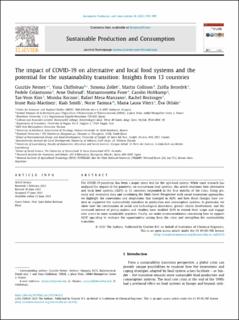| dc.contributor.author | Nemes, Gusztáv | |
| dc.contributor.author | Chiffoleau, Yuna | |
| dc.contributor.author | Zollet, Simona | |
| dc.contributor.author | Collison, Martin | |
| dc.contributor.author | Benedek, Zsófia | |
| dc.contributor.author | Colantuono, Fedele | |
| dc.contributor.author | Dulsrud, Arne | |
| dc.contributor.author | Fiore, Mariantonietta | |
| dc.contributor.author | Holtkamp, Carolin | |
| dc.contributor.author | Kim, Tae-Yeon | |
| dc.contributor.author | Korzun, Monika | |
| dc.contributor.author | Mesa-Manzano, Rafael | |
| dc.contributor.author | Reckinger, Rachel | |
| dc.contributor.author | Ruiz-Martínez, Irune | |
| dc.contributor.author | Smith, Kiah | |
| dc.contributor.author | Tamura, Norie | |
| dc.contributor.author | Viteri, Maria Laura | |
| dc.contributor.author | Orbán, Éva | |
| dc.date.accessioned | 2022-02-15T08:23:54Z | |
| dc.date.available | 2022-02-15T08:23:54Z | |
| dc.date.created | 2021-12-13T12:53:32Z | |
| dc.date.issued | 2021-07-06 | |
| dc.identifier.citation | Sustainable Production and Consumption. 2021, 28 591-599. | en_US |
| dc.identifier.issn | 2352-5509 | |
| dc.identifier.uri | https://hdl.handle.net/11250/2978947 | |
| dc.description.abstract | The COVID-19 pandemic has been a major stress test for the agri-food system. While most research has analysed the impact of the pandemic on mainstream food systems, this article examines how alternative and local food systems (ALFS) in 13 countries responded in the first months of the crisis. Using primary and secondary data and combining the Multi-Level Perspective with social innovation approaches, we highlight the innovations and adaptations that emerged in ALFS, and how these changes have created or supported the sustainability transition in production and consumption systems. In particular, we show how the combination of social and technological innovation, greater citizen involvement, and the increased interest of policy-makers and retailers have enabled ALFS to extend their scope and engage new actors in more sustainable practices. Finally, we make recommendations concerning how to support ALFS’ upscaling to embrace the opportunities arising from the crisis and strengthen the sustainability transition. | en_US |
| dc.description.sponsorship | Hungary's input was funded by NKFIH contract numbers K-129097 and FK135460, and by topic research number 2000412, contributed by the Centre for Economic and Regional Studies, Institute of Economics (Hungary). Research in France has been supported by the Fondation de France, the Fondation Carasso and self-funding; in Australia by the Australian Research Council (DE190101126), in Japan by the FEAST Project (No.14200116), Research Institute for Humanity and Nature (RIHN); in Spain by the ROBUST project, as part of the Horizon 2020 Framework Programme of the European Union, under Grant Agreement No. 727988. The information and views set out in this article are those of the authors and do not necessarily reflect the official opinion of the European Union. | en_US |
| dc.language.iso | eng | en_US |
| dc.publisher | Elsevier | en_US |
| dc.relation.ispartofseries | Sustainable Production and Consumption;Volume 28 | |
| dc.rights | Attribution-NonCommercial-NoDerivatives 4.0 Internasjonal | * |
| dc.rights.uri | http://creativecommons.org/licenses/by-nc-nd/4.0/deed.no | * |
| dc.subject | COVID-19 | en_US |
| dc.subject | Food systems | en_US |
| dc.subject | Crisis responses | en_US |
| dc.subject | Social innovation | en_US |
| dc.subject | Technological innovation | en_US |
| dc.subject | Sustainability transitions | en_US |
| dc.title | The impact of COVID-19 on alternative and local food systems and the potential for the sustainability transition: Insights from 13 countries | en_US |
| dc.type | Peer reviewed | en_US |
| dc.type | Journal article | en_US |
| dc.description.version | publishedVersion | en_US |
| dc.rights.holder | © 2021 The Authors | en_US |
| cristin.ispublished | true | |
| cristin.fulltext | original | |
| cristin.qualitycode | 1 | |
| dc.identifier.doi | https://doi.org/10.1016/j.spc.2021.06.022 | |
| dc.identifier.cristin | 1967760 | |
| dc.source.journal | Sustainable Production and Consumption | en_US |
| dc.source.volume | 28 | en_US |
| dc.source.pagenumber | 591-599 | en_US |
| dc.relation.project | EC/H2020: 727988 | en_US |

